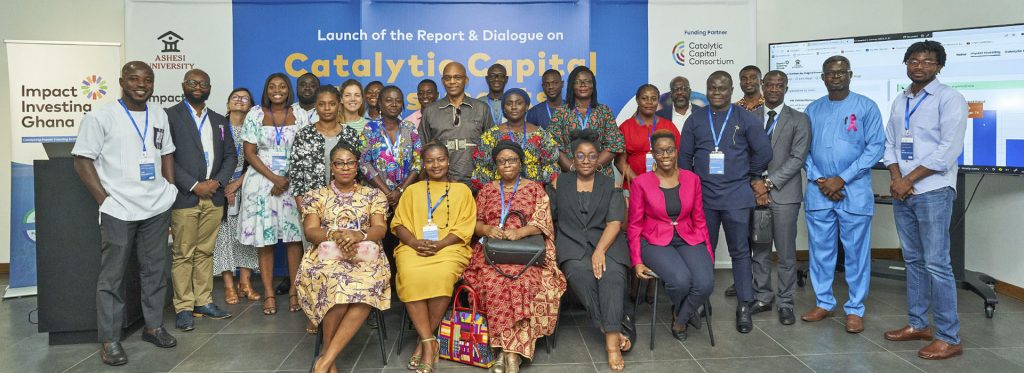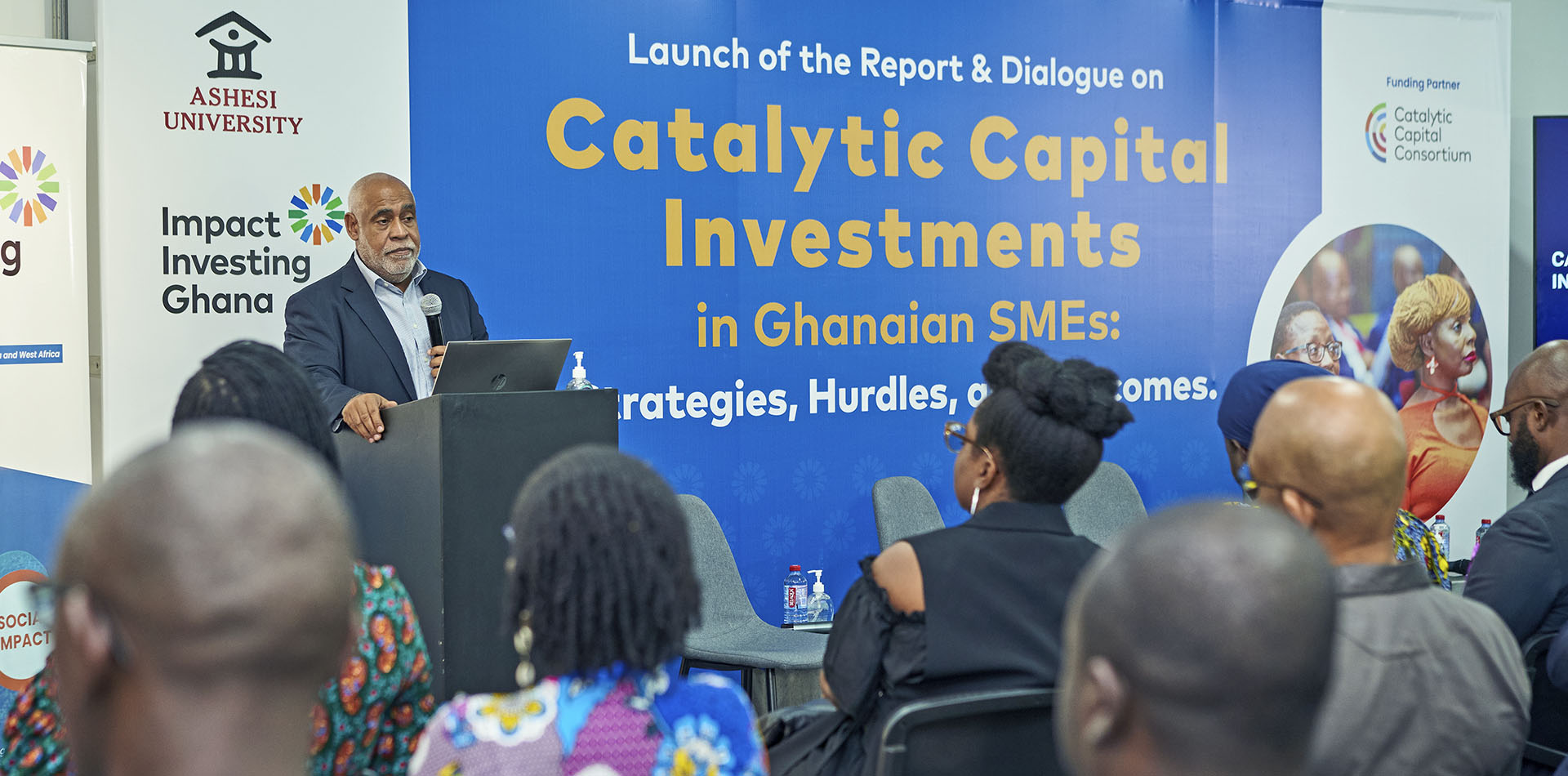Ghana (Ashesi University) Ashesi-Impact Investing Ghana report provides insights for financing small and medium enterprises

Accra, November 2022: Impact Investing Ghana (IIGh) and Ashesi University have launched a comprehensive report on Catalytic Capital in Ghana and how decision-makers can leverage this critical tool to increase the economic impact of Small and Medium Enterprises (SMEs). Catalytic capital refers to capital willing to accept disproportionate risk and concessionary return to generate a positive impact and enable third-party investments that otherwise would not be possible. The study was conducted with funding from the Catalytic Capital Consortium, an investment, learning and market development initiative launched in 2019 by the John D. and Catherine T. MacArthur Foundation, the Rockefeller Foundation, and Omidyar Network.
Across Sub-Saharan Africa, small and medium-sized enterprises (SMEs) face a nearly $331 billion financing gap. In Ghana, SMEs, a vital part of the nation’s economy, face an estimated $4.8 billion gap in financing needed to grow, scale up, or even survive – one of the largest in Africa. The IIGh – Ashesi report analysed catalytic capital deployed to SMEs in Ghana since 2004 and, based on this, provided a framework to close the country’s current funding gap.
- Support for efforts in Ghana to increase the supply of catalytic capital, including: innovative financing vehicles designed to deliver appropriate finance for SMEs; action by philanthropic foundations to include catalytic capital in their program activities; efforts by private sector actors to partner with catalytic capital providers; and actions by the government to disburse funding in ways that are catalytic, transparent and unlock additional third-party investments.
- Development Finance Institutions (DFIs) making commitments to take on more risk and be truly catalytic, for example, by working with emerging fund managers and financing innovative funding vehicles.
- Action by International Development Agencies (IDAs) to participate in blended finance vehicles and use structures such as pay-for-performance incentives to crowd in private sector funding.
- A commensurate increase in funding for technical assistance and transaction advisory work to strengthen the quality of enterprise support and increase the ability of SMEs to leverage Catalytic Capital.
- Creation of affordable currency hedging solutions and for the government to put in more effort to stabilise the local currency.
- Addressing the impact the report could have at a public event in Accra, CEO of IIGh Amma Lartey shared that conventional capital has not been effective at closing the financing gap because it generally perceives SMEs as too small and too risky. Impact investors—investors targeting enterprises seeking to make a social impact— also tend to require market rate returns and can be unwilling to make concessions for innovative models to launch and scale. Catalytic capital providers with the vision and the willingness to take on more risk can enable SMEs to grow, achieve exponential impact, and ultimately deliver the returns expected.
Dr. Gordon Adomdza, Associate Professor and lead for the study at Ashesi University, also emphasised the importance of data and insights that can help design stronger financial institutions, products and investments as we seek to transform Ghana’s SME sector. He gave attendees at the public launch a preview of a Ghana Investing Online Map – launching soon – that will provide data to researchers and investors.The public launch was attended by key ecosystem players, with speakers including Charles Abani (UN Resident Coordinator for Ghana), Mirabelle Moreaux (Board member of Impact Investing Ghana), Sangu Delle (Board Director of Ashesi University), Nana Osei Bonsu (CEO of the Private Enterprise Federation), and Hamdiya Ismaila, General Manager of the Venture Capital Trust Fund.Key Links
- Click here to download the full report
- To find out more about how you can support action to increase catalytic capital and appropriate financing for SMEs, visit: impactinvestinggh.org
About Ashesi University
The mission of Ashesi is to educate a new generation of ethical, entrepreneurial leaders in Africa; to cultivate within our students the critical thinking skills, the concern for others and the courage it will take to transform their continent. By raising the bar for higher education in Africa, we aim to significantly contribute to a renaissance in Africa.The University began instruction in March 2002 and quickly gained a reputation for innovation and quality education. Ashesi is the first University in Ghana to adopt and blend the liberal arts model with majors in Computer Science, Management Information Systems, Business Administration, and Engineering. Through its work with partners, Ashesi has impacted education outcomes for some 150,000 students across Africa. The University is committed to applied research as a critical aspect of its work to strengthen the impact of higher education in Africa.
About Impact Investment Ghana (IIGh)
Impact Investing Ghana (IIGh) is the Ghana National Advisory Board for Impact Investing. We are an independent private-sector-led initiative promoting sustainable development and advancing the development of the impact investment ecosystem in Ghana. Established as a nonprofit, IIGh is Ghana’s representative to the Global Steering Group (GSG) for Impact Investing, the successor to the Social Impact Investment Taskforce established by the G8. IIGh aims to tackle Ghana’s pressing social and environmental challenges by driving more capital to deliver real impact.We are a local platform bringing together all the stakeholder groups needed to redirect significant capital flows towards social and environmental impact, including leaders from finance, business, government, social organisations and philanthropy. Private-sector-led, yet in close partnership with the national government, we raise awareness, create market intelligence, change policies, and mobilise additional financial resources for the public good. IIGh has an ambitious plan to support the growth of impact ventures and to catalyse $1 billion in impact funds for investment in impact ventures in Ghana and the West African sub-region, prioritising areas including reducing underemployment and unemployment, reducing inequality gaps and addressing climate and environmental issues.

